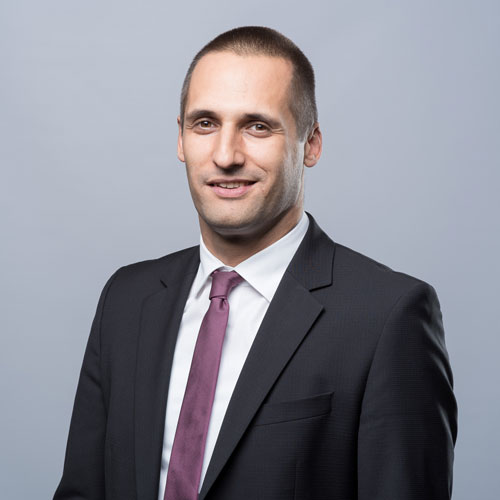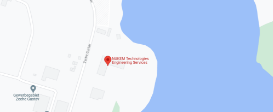
Interview with Dr. José Fernández Puga, 44, Director Engineering, regarding mobile working
Dr. José Fernández Puga was a mechanical engineering major at the Technical University of Kaiserslautern and subsequently received his doctorate in the field of fluid mechanics. He gained his first work experience at NUKEM. After having spent some time away from the company, he resumed his work at NUKEM, where from 2015 he headed the Mechanical Engineering / Plant Engineering department and, at the same time, acted as a project manager and project engineer. On 1 May 2020 Mr Fernández Puga was appointed Director of the Engineering Business Unit. It was the time when about 1/3 of the NUKEM staff worked from home. We spoke with Mr Fernandez Puga about the way he arranged the interaction with the colleagues during that time, about his own working-from-home experience and about the conclusions he draws now, five months later.
Switching to mobile work led to certain organizational changes in the beginning, for example in the infrastructure. Some employers were allowed to take home their desktop computers and monitors. We checked whether everybody had access to required applications and, if necessary, purchased additional equipment. Redirecting calls from the company landline to business or private mobile phones was also arranged. For those activities that needed actual presence at the office, our employers were ready to come to the office.
How did you personally manage looking after the children and working from home?
It was hard because the kids also had school assignments. Even though they generally did them on their own in their room, they still needed our help from time to time. The coordination between both parents was very important. Since the kids did not have to get up for school, they stayed up late and got up later than usual. Thanks to this, it was also possible to work in the morning while they were still in bed, and in the evening, when they were already asleep. The working time was more flexible, but, at the same time, we had to work longer hours because we had to take repeated breaks in between to take care of the children.
Mr Fernández, you conducted the so-called standup meetings with your department on a regular basis at the beginning of the pandemics when most of your staff were working from home. Could you please tell us more about them?
Our standup meetings took place several times a week. All department staff who were not involved in other meetings took part in them. The first part was always on a rather private level, I asked people how they were dealing with the situation and whether there were any problems. After a short conversation on personal matters, we would proceed with discussing individual projects. The project status would be presented, and we would discuss whether additional support was needed. In case of any problems this regular coordination helped respond promptly and efficiently.
How could the completion of the tasks by the employees be tracked?
Since the employees are assigned to specific projects, their tasks are also related to the projects. During the standup meetings we discussed the current status, the upcoming deadlines and the expected results. Activities and priorities depend on a specific project.
Did the coronavirus situation cause any standstill on tasks or project downtime?
No, the employees continued to be busy. In some projects, delays did occasionally occur, e.g. due to suppliers experiencing difficulties, but documents could still be prepared and the work at our mock-up facility went on.
The office is the place where social connections take place. Especially at the beginning of the pandemics lots of people suffered from the lack of social contacts. How did you manage to reduce this negative impact?
Having lunch together or making a small talk at the coffee machine was not possible anymore. To keep up a personal dialogue, we often talked via Teams or over the phone. I always tried to talk to the people personally even if I just needed some brief information. It helped me to stay connected to the colleagues during the time when they worked from home so that no one would feel left out and abandoned.
How efficient did your team remain?
I think that the efficiency remained the same. In some areas, we actually even increased the level of performance. The flexible work organization partly improved the satisfaction level. We received positive feedback, e.g. that the document preparation worked out better at home than at the office. The acceptance of mobile work by some employees increased as well. But, at the same time there was certainly also negative feedback regarding the lacking social connections.
Did you personally face any disturbances during the time when you were working from home, such as noise from a construction site nearby or from the neighbors?
No, I personally didn‘t. But some employees mentioned that young kids next door, who had to stay home because there was no school, played in the garden a lot. Such short-term distractions are normal part of mobile work. They do not cause efficiency losses.
Do the travel restrictions have impact on the cooperation with the customers?
Even though some of the business travel was not possible, we still managed to complete most of our tasks. For example, the preparation of drawings and documents, and placing orders with suppliers. This crisis is also an opportunity because customers see that meetings can also take place in the form of video conferences - while in the past some customers always insisted on meeting in person.
Mr Fernández, could you summarize by drawing a conclusion on how the work of the company changed – or maybe even improved – because of the pandemics?
The pandemics showed us that it does not matter where your workplace is located. At the same time, we also realized that it is important to keep up, or even enhance, the communication with each other. The timely introduction of Teams as a communication tool and the provision of the necessary hardware made it possible for us to pull though the first phase of the pandemics with almost no friction loss. Summing up we can say that we have learnt to be more flexible at work.
NUKEM Technologies in Karlstein am Main, Germany, is world-wide active in the areas of management of radioactive waste and spent fuel, decommissioning of nuclear facilities, engineering and consulting. For more than 60 years NUKEM Technologies provides high quality products, technologies and services, where Innovation, Solutions and Excellence are closely linked.
Contact:
Yvonne Amend
NUKEM Technologies Engineering Services GmbH
Zeche Gustav 6, 63791 Karlstein am Main
Tel: +49 6023 91-1321,
E-mail:
www.nukemtechnologies.de





